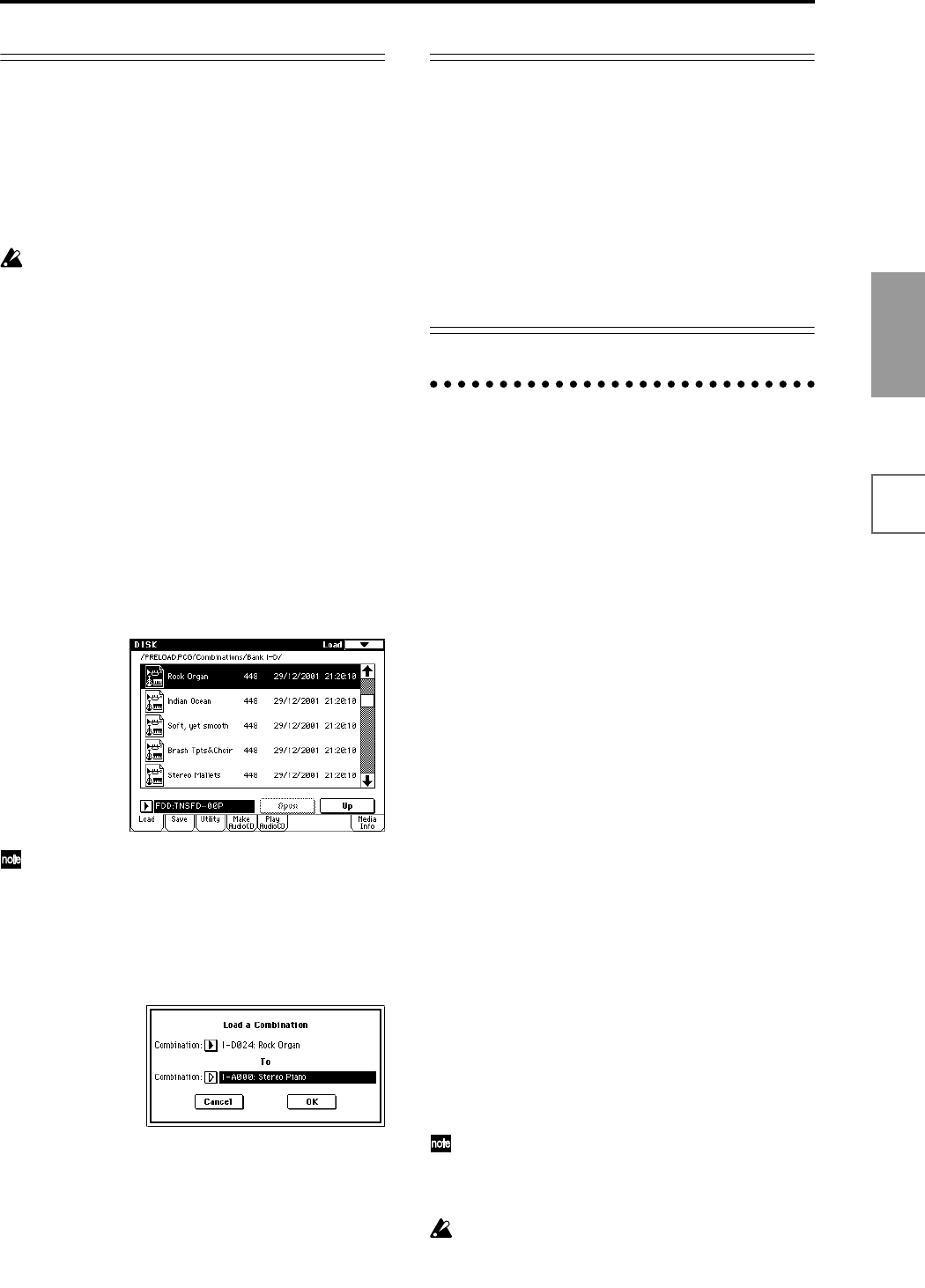
65
Basic functions
Saving dataLoading dataProgram
settings
Combination
settings
Producing
songs
Sampling
settings
Creating a
CD
SMF
playback
System
settings
Drum kit
settings
Arpeggiator
settings
Effects
settings
Other
functions
Loading data by individual item or bank
The TRITON STUDIO lets you load programs and combi-
nations individually or by individual banks. Drum kits
and arpeggio patterns can also be loaded individually or
as a group.
This allows you to restore just an individual item to its
factory setting, or to rearrange combinations (for exam-
ple) in the order in which they will be played during a
concert.
Be aware that if you change the order of programs,
the sounds played by combinations may also be
affected. (☞p.149)
As an example, here’s how to load the combination INT-
D024: Rock Organ into INT-A000.
1 From the “Bank I-A” directory, and select “Rock
Organ.” (PRELOAD.PCG/Combinations/Bank I-D/)
The procedure is as follows.
1) Perform steps 1–4 of the preceding procedure,
press “PRELOAD.PCG’ to highlight it, and press
the Open button.
2) Press “Combinations” to highlight it, and press the
Open button.
3) Press “Bank I-D” to highlight it, and press the Open
button.
4) Press the scroll bar to find “Rock Organ,” and press
“Rock Organ” to highlight it.
Alternatively, you could select any file, since the
desired file can be selected later from the dialog box.
When you press the keyboard of the TRITON STU-
DIO, the selected combination will sound. However,
the internal programs will be used as the program of
each timbre.
2 Press the page menu button and select the “Load
Selected” page menu command.
The dialog box will appear.
3 Use the “Combination” (upper line) to select the
load-source combination, and use “(To) Combina-
tion” (lower line) to specify the destination combina-
tion. For this example, select A000: Combi I-A000.
4 Press the OK button to load the data. A000 will now
be Rock Organ.
Contents of the included floppy disk
The TRITON STUDIO comes with one floppy disk
(TNSFD-00P).
The disk contains the following data.
TNSFD-00P
PRELOAD.PCG (already loaded when the TRITON STU-
DIO is shipped)
• Programs (bank I-A, I-B, I-C, I-D, I-E)
• Combinations (bank I-A, I-B, I-C, I-D)
• Drum Kits (000–015 (I-A/B), 128–143 (User))
• Arpeggio Patterns (000–199 (I-A/B), 312–506 (User))
This is the preloaded data (programs, combinations,
drum kits, arpeggio patterns, global settings).
Loading .PCG files and .SNG files from
the floppy disks included with the EXB-
PCM series and EXB-MOSS options
The floppy disk included with each EXB-PCM series
option and the EXB-MOSS option contains .PCG files and
.SNG files that match the bank structure of the TRITON/
TRITONpro/TRITONproX. (As of March 2002)
EXB-PCM series
EXB-PCM01–05
In each disk, C_BANK.PCG (.SNG) and D_BANK.PCG
(.SNG) contain the same data, but use different banks.
EXB-PCM08
The data contained on the EXB-PCM08 is already
included in the TRITON STUDIO’s Piano PCM ROM.
EXB-PCM06/07
C_BANK.PCG and D_BANK.PCG contain different pro-
grams, combinations, drum kits, and arpeggio patterns.
When loading these TRITON/TRITONpro/TRITONproX
format files from the EXB-PCM series disks into the TRI-
TON STUDIO, you should load bank I-C of
C_BANK.PCG or bank I-D of D_BANK.PCG, and not load
banks I-A and I-B. We also recommend that you select
EXB-A–EXB-G as the bank into which this data will be
loaded.
Here is an example of how various files from the floppy
disks included with the EXB-PCM01–07 can be loaded
into banks EXB-A–EXB-G of the TRITON STUDIO.
• EXB-PCM01: file for bank C → load to bank EXB-A
• EXB-PCM02: file for bank C → load to bank EXB-B
• EXB-PCM03: file for bank C → load to bank EXB-C
• EXB-PCM04: file for bank C → load to bank EXB-D
• EXB-PCM05: file for bank C → load to bank EXB-E
• EXB-PCM06/07: file for bank C → load to bank EXB-F
• EXB-PCM06/07: file for bank D → load to bank EXB-G
The loading destination banks need not be in the
above order. Load the data into any bank (EXB-A–
EXB-G) that will make it easy for you to keep your
data organized.
EXB-PCM boards can be installed in any slot 1–7.
(☞PG p.286)


















